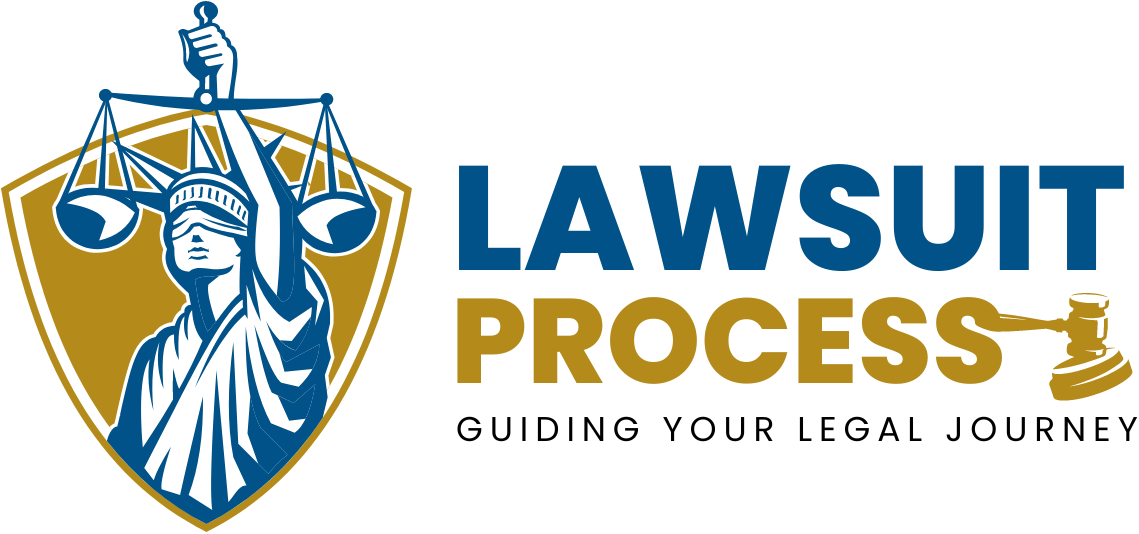The process of filing a lawsuit can feel intimidating, especially if you’ve never been involved in one before. However, understanding the step-by-step process can take away much of the confusion and fear. Whether you’re filing against an individual, a business, or an institution, the procedure typically follows a consistent path. This guide will walk you through what to expect, what’s required, and how to protect your rights throughout the journey.
Table of Contents
- 1. Determine If You Have a Valid Legal Claim
- 2. Attempt to Resolve the Issue Informally
- 3. Hire an Attorney (Optional but Recommended)
- 4. File a Complaint
- 5. Serve the Defendant
- 6. The Defendant Responds
- 7. Discovery Phase
- 8. Pretrial Motions and Hearings
- 9. Settlement Discussions
- 10. Trial
- 11. Appeals (If Necessary)
- 12. Enforcing the Judgment
- Key Takeaway
- Frequently Asked Questions About Filing a Lawsuit
1. Determine If You Have a Valid Legal Claim
Before filing a lawsuit, you must first ask: do I have a legitimate case? This means identifying a legal basis for your complaint. Common grounds include breach of contract, personal injury, property damage, defamation, or employment disputes.
You’ll need to consider:
- Was there harm or damage caused?
- Is there evidence to support your claim?
- Does the law recognize your complaint as actionable?
Consulting with a qualified attorney at this stage can save time and money down the road.
2. Attempt to Resolve the Issue Informally
Many disputes can be resolved without going to court. It’s often a good idea to try informal negotiation or mediation first. This not only saves time and legal costs but can also preserve relationships.
Common ways to resolve disputes out of court include:
- Direct negotiation with the other party
- Mediation with a neutral third party
- Arbitration if previously agreed upon in a contract
If those efforts fail, filing a formal lawsuit may be necessary.
3. Hire an Attorney (Optional but Recommended)
Technically, you can file a lawsuit without a lawyer. This is called “pro se” representation. But unless your case is very simple, hiring an experienced attorney is wise. They understand the law, court procedures, and how to advocate effectively on your behalf.
Most lawyers offer free consultations, so it’s worth exploring your options.
4. File a Complaint
The lawsuit officially begins when you file a complaint with the appropriate court. This document outlines your case, including:
- Facts of the dispute
- Legal reasons for the lawsuit
- What you are asking the court to do (called “relief”)
You’ll also need to pay a filing fee. If you can’t afford it, the court may offer a fee waiver in some cases.
5. Serve the Defendant
Once the complaint is filed, the next step is service of process. This means delivering legal notice of the lawsuit to the defendant (the person or entity you’re suing).
Proper service ensures the defendant has a chance to respond. This is usually done by:
- A sheriff
- A process server
- Certified mail (in some jurisdictions)
6. The Defendant Responds
After being served, the defendant typically has a specific number of days (often 20 to 30) to file an answer to your complaint. In that response, they may:
- Deny the allegations
- Raise legal defenses
- File a counterclaim against you
If the defendant fails to respond, you may be able to request a default judgment in your favor.
7. Discovery Phase
Once both sides have filed their initial documents, the case enters discovery. This is where each party gathers evidence to support their claims or defenses. Discovery may involve:
- Written questions (interrogatories)
- Requests for documents
- Depositions (sworn out-of-court testimony)
- Requests for admissions
This phase can take weeks to months, depending on the complexity of the case.
8. Pretrial Motions and Hearings
Before the trial, either side may file motions to resolve or narrow down issues. Common pretrial motions include:
- Motion to dismiss
- Motion for summary judgment
- Motion to compel discovery
The court may also hold status conferences to manage the schedule or encourage settlement discussions.
9. Settlement Discussions
At any point during the process, the parties can settle the case voluntarily. In fact, most lawsuits never go to trial because they settle beforehand.
Settlement can happen through:
- Negotiation between lawyers
- Mediation
- Court-mandated settlement conferences
If a fair resolution is reached, the case ends with a signed settlement agreement.
10. Trial
If no settlement occurs, the case proceeds to trial. This may be a bench trial (decided by a judge) or a jury trial. Each side presents evidence, examines witnesses, and makes legal arguments.
At the end, the judge or jury will issue a decision. If you win, you may be awarded damages or other legal remedies. If you lose, you may be responsible for the other side’s legal costs, depending on the case and jurisdiction.
11. Appeals (If Necessary)
If you believe the trial was unfair or legal errors occurred, you may be able to appeal. Appeals go to a higher court and are generally based on legal arguments rather than new evidence.
Keep in mind, appeals can be time-consuming and expensive, and not all decisions are reversible.
12. Enforcing the Judgment
Winning the case doesn’t always mean the other party will pay or comply. You may need to take further steps to enforce the judgment. This could involve:
- Garnishing wages
- Placing liens on property
- Using court orders to collect
An attorney can help navigate this final stage if the defendant refuses to comply.
Key Takeaway
Filing a lawsuit is a structured, multi-step process designed to ensure fairness and due process. While it can be complex, knowing each stage gives you a better chance of success and peace of mind. If you’re considering legal action, prepare thoroughly, seek legal help when needed, and always stay organized and informed.
- Start by confirming you have a valid legal claim.
- Try informal resolution methods first, like negotiation or mediation.
- Hire a lawyer if your case involves complex issues.
- File your complaint with the appropriate court and serve the defendant.
- The defendant must respond within a set time period.
- Engage in discovery to gather and exchange evidence.
- Pretrial motions may resolve or narrow down parts of the case.
- Most lawsuits settle before reaching trial.
- If needed, the case proceeds to trial for a final decision.
- You can appeal the decision if there were legal mistakes.
- If you win, take steps to enforce the court’s judgment.
Frequently Asked Questions About Filing a Lawsuit
1. What are the first steps in filing a lawsuit?
The first step is determining if you have a valid legal claim. Then, gather evidence, consult a lawyer if needed, and prepare a complaint to file with the court.
2. How do I know if I have a valid legal claim?
You must show that you suffered harm and that the other party was legally responsible. A lawyer can help you evaluate your situation.
3. Can I file a lawsuit without a lawyer?
Yes, you can represent yourself (called “pro se”). However, legal procedures can be complex, so hiring a lawyer is often helpful.
4. What court do I file my lawsuit in?
The correct court depends on the type of case and how much money is involved. It may be a local, state, or federal court.
5. How much does it cost to file a lawsuit?
Filing fees vary by court and case type. Costs typically range from $30 to several hundred dollars. Additional fees may apply for serving documents or hiring experts.
6. What information is required in a lawsuit complaint?
The complaint must include the names of the parties, facts of the case, legal claims, and what relief you are seeking from the court.
7. What is the statute of limitations for filing a lawsuit?
This is the time limit to file a lawsuit. It varies by case type and state. For example, personal injury claims may have a 2- or 3-year limit.
8. How do I serve the defendant after filing a lawsuit?
You must officially notify the defendant using a process server, sheriff, or certified mail, depending on local rules.
9. What happens if the defendant doesn’t respond to the lawsuit?
If the defendant ignores the case, you can ask the court for a default judgment in your favor.
10. What is the discovery process in a lawsuit?
Discovery is when both sides exchange information, documents, and evidence. It helps prepare for trial or settlement.
11. How long does a lawsuit typically take from start to finish?
It depends on the case’s complexity. Some lawsuits resolve in months; others may take years, especially if they go to trial.
12. Can a lawsuit be settled out of court?
Yes, most lawsuits settle before trial. Parties can negotiate a resolution at any time during the process.
13. What is a pretrial motion in a lawsuit?
Pretrial motions are legal requests made before trial. Common ones include motions to dismiss or motions for summary judgment.
14. What happens during a trial?
Each side presents evidence and witnesses. The judge or jury decides the outcome based on the facts and law.
15. What is a bench trial versus a jury trial?
In a bench trial, the judge decides the case. In a jury trial, a group of citizens hears the evidence and gives a verdict.
16. How do I appeal a court decision?
You file an appeal with a higher court, usually based on legal errors during the trial. New evidence usually isn’t allowed.
17. What is a default judgment in a lawsuit?
If the defendant doesn’t respond or appear in court, the judge can rule in your favor by default.
18. How do I collect money after winning a lawsuit?
If the other party doesn’t pay, you can request wage garnishment, bank account levies, or liens on their property.
19. What if I can’t afford to file a lawsuit?
You may qualify for a fee waiver from the court. Some lawyers also work on contingency, meaning they only get paid if you win.
20. Can I sue someone in small claims court instead?
Yes, if your case involves a smaller amount of money (limits vary by state). It’s quicker, cheaper, and often doesn’t require a lawyer.
21. What are the risks of filing a lawsuit?
You could lose the case and owe legal fees. It also takes time, can be stressful, and may affect your personal or business relationships.
22. How do I respond to a lawsuit filed against me?
You must file an official answer with the court by the deadline. Ignoring it can lead to a default judgment against you.
23. What is the difference between a civil and criminal lawsuit?
Civil lawsuits involve disputes between people or businesses. Criminal cases involve charges by the government for breaking the law.
24. Can I file a lawsuit for emotional distress?
Yes, but you must prove that the emotional distress was severe and caused by someone else’s extreme or reckless behavior.
25. What happens if I lose a lawsuit?
You may have to pay the other party’s costs or damages. You can appeal if you believe the decision was legally wrong.
26. Can I represent someone else in a lawsuit?
Generally, no. Only licensed attorneys can represent others in court. Exceptions may apply in small claims or with legal guardians.
27. How can mediation or arbitration help avoid a lawsuit?
Mediation and arbitration are alternative dispute resolution methods. They are often faster, less expensive, and less formal than court.










